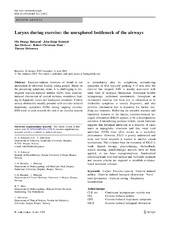Larynx during exercise: the unexplored bottleneck of the airways
Peer reviewed, Journal article
Published version
Permanent lenke
https://hdl.handle.net/1956/9656Utgivelsesdato
2014-07-18Metadata
Vis full innførselSamlinger
Originalversjon
https://doi.org/10.1007/s00405-014-3159-3Sammendrag
Exercise-induced shortness of breath is not uncommon in otherwise healthy young people. Based on the presenting symptoms alone, it is challenging to distinguish exercise-induced asthma (EIA) from exercise-induced obstruction of central airways, sometimes leading to diagnostic errors and inadequate treatment. Central airway obstruction usually presents with exercise-induced inspiratory symptoms (EIIS) during ongoing exercise. EIIS tends to peak towards the end of an exercise session or immediately after its completion, contradicting symptoms of EIA typically peaking 3–15 min after the exercise has stopped. EIIS is usually associated with some form of laryngeal obstruction. Transnasal flexible laryngoscopy performed continuously throughout an incremental exercise test from rest to exhaustion or to intolerable symptoms is usually diagnostic, and also provides information that is important for further handling and treatment. Reflecting the complex anatomy and functional features of the larynx, exercise-induced laryngeal obstruction (EILO) appears to be a heterogeneous condition. Contradicting previous beliefs, recent literature suggests that laryngeal adduction in a majority of cases starts in supraglottic structures and that vocal cord adduction (VCD) most often occurs as a secondary phenomenon. However, EILO is poorly understood and more and better research is needed to unravel causal mechanisms. The evidence base for treatment of EILO is weak. Speech therapy, psychotherapy, biofeedback, muscle training, anticholinergic aerosols have all been applied, as has laser supraglottoplasty. Randomized controlled trials with well-defined and verifiable inclusion and success criteria are required to establish evidence-based treatment schemes.
Tidsskrift
European Archives of Oto-Rhino-LaryngologyOpphavsrett
Copyright 2014 The AuthorsBeslektede innførsler
Viser innførsler beslektet ved tittel, forfatter og emneord.
-
The relationship between exercise-induced cardiac Troponin increase and physical workload during prolonged strenuous exercise : North Sea Endurance Exercise Study (NEEDED) 2018
Bjørkavoll-Bergseth, Magnus (Doctoral thesis, 2024-06-06)Bakgrunn Høye nivåer av kardial troponin (cTn) er knyttet til økt dødelighet og en høyere sjanse for udiagnostisert koronararteriesykdom (CAD). Denne avhandlingen hadde som mål å undersøke sammenhengen mellom treningsintensitet ... -
Exercise related respiratory problems in the young—Is it exercise-induced bronchoconstriction or laryngeal obstruction?
Vollsæter, Maria; Stensrud, Trine; Maat, Robert; Halvorsen, Thomas; Røksund, Ola Drange; Sandnes, Astrid; Clemm, Hege Synnøve Havstad (Journal article; Peer reviewed, 2022)Complaints of breathlessness during heavy exercise is common in children and adolescents, and represent expressions of a subjective feeling that may be difficult to verify and to link with specific diagnoses through objective ... -
Regular consumption of cod liver oil is associated with reduced basal and exercise-induced C-reactive protein levels; a prospective observational trial: A NEEDED (The North Sea Race Endurance Exercise Study) 2014 sub-study
Hansen, Mette Wærstad; Ørn, Stein; Erevik, Christine B.; Bjørkavoll-Bergseth, Magnus Friestad; Skadberg, Øyvind; Melberg, Tor Harald; Aakre, Kristin Moberg; Kleiven, Øyunn (Journal article; Peer reviewed, 2021)Background Dietary supplement use among recreational athletes is common, with the intention of reducing inflammation and improving recovery. We aimed to describe the relationship between omega-3 fatty acid supplement use ...

